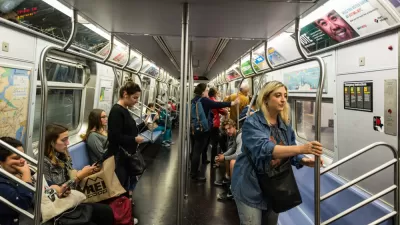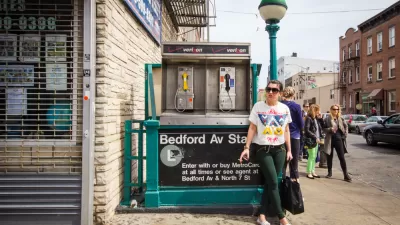Sam Roberts tells the story of commuting in New York City, starting from the very beginning, the maiden voyage of the first ferry from Brooklyn to Manhattan.
The article by Sam Roberts is a thorough and excellent examination of how significant moments in history can have large influence on the day-to-day lives of millions. A few highlights from the article, to provide an overview, with a lot more detail available in the full article:
- "This much is known about the maiden voyage of the Nassau: The twin-hulled boat carried 549 passengers, one wagon and three horses. It was captained by Peter Coffee, who would remain with the company that operated the vessel for 50 years."
- "What is unknown is the name of the first passenger — the man (and chances are it was a man) who on May 10, 1814, boarded the Nassau, the first regularly scheduled steam-powered ferry from Brooklyn to Manhattan. Whoever he was, he can justly be called America’s first commuter."
- "In 1814, when 'The Star-Spangled Banner' was written and the steam locomotive was introduced, Brooklyn was still a town. It was incorporated as a village, population 2,000, two years later, and officially became a city in 1834."
- "Today, two centuries after the first ferry left Brooklyn, New Yorkers have not stopped complaining. More than ever, though, they are commuting — and, lately, more and more by ferry."
FULL STORY: How a Ferry Ride Helped Make Brooklyn the Original Suburb

Maui's Vacation Rental Debate Turns Ugly
Verbal attacks, misinformation campaigns and fistfights plague a high-stakes debate to convert thousands of vacation rentals into long-term housing.

Planetizen Federal Action Tracker
A weekly monitor of how Trump’s orders and actions are impacting planners and planning in America.

In Urban Planning, AI Prompting Could be the New Design Thinking
Creativity has long been key to great urban design. What if we see AI as our new creative partner?

The Vast Potential of the Right-of-Way
One writer argues that the space between two building faces is the most important element of the built environment.

Florida Seniors Face Rising Homelessness Risk
High housing costs are pushing more seniors, many of them on a fixed income, into homelessness.

Massachusetts Budget Helps Close MBTA Budget Gap
The budget signed by Gov. Maura Healey includes $470 million in MBTA funding for the next fiscal year.
Urban Design for Planners 1: Software Tools
This six-course series explores essential urban design concepts using open source software and equips planners with the tools they need to participate fully in the urban design process.
Planning for Universal Design
Learn the tools for implementing Universal Design in planning regulations.
Gallatin County Department of Planning & Community Development
Heyer Gruel & Associates PA
JM Goldson LLC
City of Camden Redevelopment Agency
City of Astoria
Transportation Research & Education Center (TREC) at Portland State University
Jefferson Parish Government
Camden Redevelopment Agency
City of Claremont





























